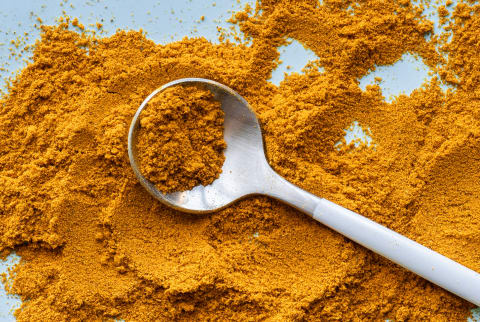Advertisement
Why Turmeric Bioavailability Is So Important + How PNS Technology Gives It A Boost


For all of its many perks, turmeric comes with one major drawback: It has inherently low bioavailability.
When you consume the spice as is, you metabolize it so quickly that very little actually remains to be absorbed by the body. This leaves some of its benefits for immune health, inflammatory response, muscle fitness, recovery, and mood on the table (or, more accurately, down the toilet).*
Now for the good news. To solve this bioavailability dilemma and present a new way to enjoy this ancient spice, mindbodygreen created a supplement that makes turmeric up to 10 times easier for the body to absorb (and thus, reap its multidimensional benefits).* Meet turmeric ginger+.
How to make turmeric more bioavailble
The secret-sauce technology in turmeric ginger+ is called polar-nonpolar-sandwiching, or PNS.
PNS makes it possible to protect the main bioactives of plant compounds (in turmeric's case, curcuminoids) from getting lost. It does this by actually arranging the plant compounds in a way that makes them easier to absorb. With PNS technology, precious curcuminoid phytonutrients find their home between a polar molecule (turmeric water extracts) and a nonpolar molecule (turmeric essential oils).
Mid-polar by nature, turmeric needs to be linked with some sort of fat to help keep it from getting flushed away in the digestive tract. It's why the spice is paired with a fat in traditional Ayurvedic dishes like dahl and haldi doodh (golden milk). But it also needs some more soluble compounds so it isn't totally impossible to absorb. The PNS technology provides these essential polar and nonpolar layers—all sourced from the turmeric plant itself.
Think of this natural matrix like tinfoil or reusable wrap for your sandwich: It helps protect the goods inside as they go from point A to point B.
For turmeric ginger+, the destination is your bloodstream, where those bioactive, antioxidant-rich curcuminoids—along with other essential plant compounds in turmeric—can get to work. The full-spectrum turmeric in our supplement, Acumin™, has actually been shown to measurably increase curcuminoid levels in the blood for up to 24 hours after consumption in healthy people.* In fact, clinical research shows that it's up to 10 times more bioavailable than other popular forms of turmeric.*†
By enhancing curcuminoid status in the body so dramatically, Acumin™ turmeric goes above and beyond to support joint and muscle health, digestive function, immunity, and whole-body health.*
"Thanks to advanced formulation and technology, the highly potent turmeric featured in mbg's turmeric ginger+ has been optimized for bioavailability and bioefficacy,"* physician and Ayurvedic medicine expert Avanti Kumar-Singh, M.D., says of the product.
To enhance and sustain the health benefits of turmeric even further, we added two more plant powerhouses to turmeric ginger+: ginger and piperine.
"Turmeric and ginger interestingly belong to the same plant family (Zingiberaceae). They act in similar ways in the body through key antioxidant and immunomodulatory actions to support a healthy inflammatory response. While turmeric and ginger have their similarities, they also work via unique biological pathways, too, giving these powerful spices synergy and individual benefits,"* Ashley Jordan Ferira, Ph.D., RDN, mbg's vice president of scientific affairs, says of the pairing.
Black pepper—a natural bioavailability enhancer—is the finishing touch on the super-absorbable supplement that's getting rave reviews from Ayurveda and longevity experts.*
The takeaway
Turmeric is a superfood that has been harnessed for its health properties for thousands of years. In turmeric ginger+, it gets a modern renovation to become even more bioavailable and beneficial.* Learn more about the product here.
